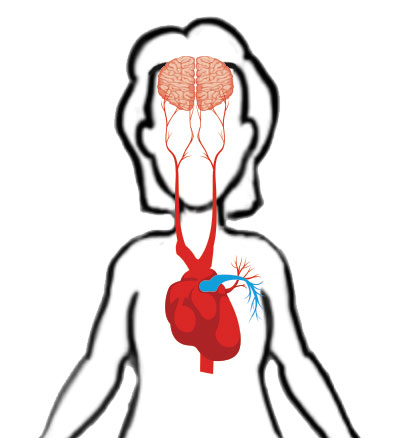- Healthcare Professionals
- Patients & Caregivers
- About AtriCure
- Canada, Central & South America
If not properly treated, atrial fibrillation gets more severe. Atrial fibrillation can lead to stroke, heart failure, and other health problems. Read about how atrial fibrillation impacts your heart and other health risks.
Atrial fibrillation is tied to a higher risk of stroke, heart failure, dementia, and other health problems.

Atrial fibrillation causes the atria to beat too fast. The atria cannot contract as they should. As a result, blood pools in the atria. When blood pools, it can clot. If a blood clot travels to the brain, it can cause a stroke.
Certain people with atrial fibrillation are at particularly high risk. For example, the risk of a stroke is higher if:1
Also, people are more likely to die from strokes related to atrial fibrillation than strokes from other causes.3
Learn About the Symptoms of a Stroke
Atrial fibrillation and heart failure are closely associated with each other. Heart failure is a condition in which your heart can't pump out enough blood to meet your body's needs. Atrial fibrillation causes physical changes in the heart. The stretching, stiffening, and uncoordinated pumping of the heart can lead to heart failure.
It’s not just that atrial fibrillation can lead to heart failure. People with atrial fibrillation are 5 times more likely to develop heart failure.4 Heart failure can also lead to more atrial fibrillation. Heart failure causes changes to heart tissue in the atrium, making atrial fibrillation much more likely.5 Symptoms get worse as heart failure progresses. Currently, heart failure has no cure. However, treatments can help people live longer and be more active.
Yes, there other health effects.
Some studies have found that dementia occurs more often among people with atrial fibrillation. This may be due to blockages in the blood vessels of the brain, or less oxygen-rich blood flowing to the brain.
Long-term fatigue can result from atrial fibrillation. This is because not enough oxygen-rich blood is pumped from the heart to the body.
The symptoms of atrial fibrillation can cause a person to become less physically active. This may also lead to fewer social activities with friends and family.7
A person’s quality of life can decline for several reasons. One reason could be the symptoms of atrial fibrillation—shortness of breath and fatigue. A second reason could be side effects of medications. Find out more about medications and lifestyle changes. A third reason could be concern that atrial fibrillation occurs while the person is alone. As a result, some people may feel anxiety. And some can even develop depression.7
For all of these reasons, proper atrial fibrillation treatment is very important.